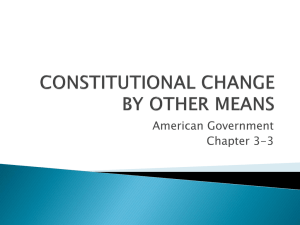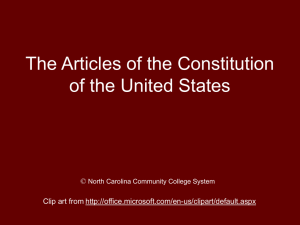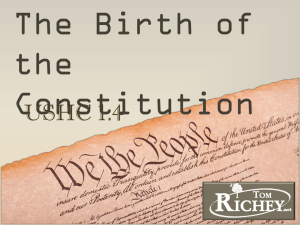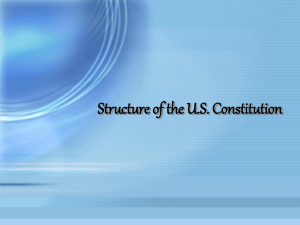Chapter 2: The Founding of a Nation
advertisement
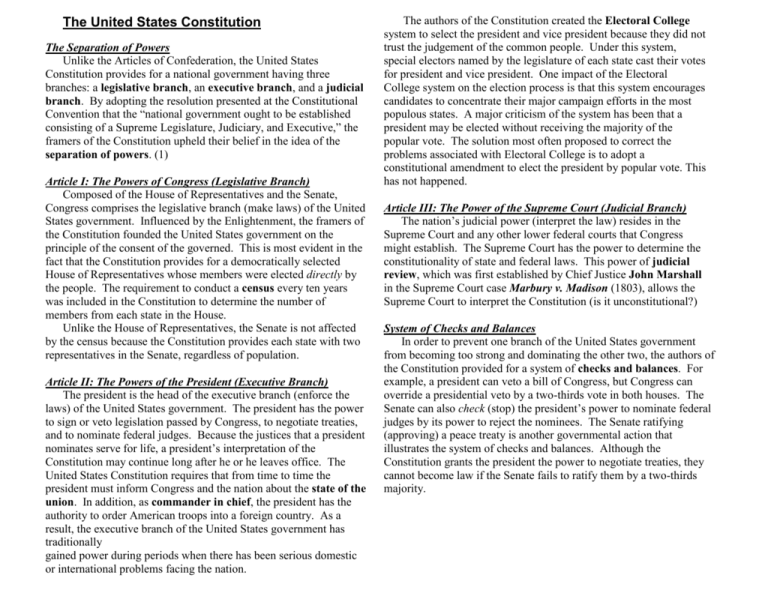
The United States Constitution The Separation of Powers Unlike the Articles of Confederation, the United States Constitution provides for a national government having three branches: a legislative branch, an executive branch, and a judicial branch. By adopting the resolution presented at the Constitutional Convention that the “national government ought to be established consisting of a Supreme Legislature, Judiciary, and Executive,” the framers of the Constitution upheld their belief in the idea of the separation of powers. (1) Article I: The Powers of Congress (Legislative Branch) Composed of the House of Representatives and the Senate, Congress comprises the legislative branch (make laws) of the United States government. Influenced by the Enlightenment, the framers of the Constitution founded the United States government on the principle of the consent of the governed. This is most evident in the fact that the Constitution provides for a democratically selected House of Representatives whose members were elected directly by the people. The requirement to conduct a census every ten years was included in the Constitution to determine the number of members from each state in the House. Unlike the House of Representatives, the Senate is not affected by the census because the Constitution provides each state with two representatives in the Senate, regardless of population. Article II: The Powers of the President (Executive Branch) The president is the head of the executive branch (enforce the laws) of the United States government. The president has the power to sign or veto legislation passed by Congress, to negotiate treaties, and to nominate federal judges. Because the justices that a president nominates serve for life, a president’s interpretation of the Constitution may continue long after he or he leaves office. The United States Constitution requires that from time to time the president must inform Congress and the nation about the state of the union. In addition, as commander in chief, the president has the authority to order American troops into a foreign country. As a result, the executive branch of the United States government has traditionally gained power during periods when there has been serious domestic or international problems facing the nation. The authors of the Constitution created the Electoral College system to select the president and vice president because they did not trust the judgement of the common people. Under this system, special electors named by the legislature of each state cast their votes for president and vice president. One impact of the Electoral College system on the election process is that this system encourages candidates to concentrate their major campaign efforts in the most populous states. A major criticism of the system has been that a president may be elected without receiving the majority of the popular vote. The solution most often proposed to correct the problems associated with Electoral College is to adopt a constitutional amendment to elect the president by popular vote. This has not happened. Article III: The Power of the Supreme Court (Judicial Branch) The nation’s judicial power (interpret the law) resides in the Supreme Court and any other lower federal courts that Congress might establish. The Supreme Court has the power to determine the constitutionality of state and federal laws. This power of judicial review, which was first established by Chief Justice John Marshall in the Supreme Court case Marbury v. Madison (1803), allows the Supreme Court to interpret the Constitution (is it unconstitutional?) System of Checks and Balances In order to prevent one branch of the United States government from becoming too strong and dominating the other two, the authors of the Constitution provided for a system of checks and balances. For example, a president can veto a bill of Congress, but Congress can override a presidential veto by a two-thirds vote in both houses. The Senate can also check (stop) the president’s power to nominate federal judges by its power to reject the nominees. The Senate ratifying (approving) a peace treaty is another governmental action that illustrates the system of checks and balances. Although the Constitution grants the president the power to negotiate treaties, they cannot become law if the Senate fails to ratify them by a two-thirds majority. UNIT 6: The United States Constitution The Bill of Rights: First Ten Amendments to Constitution The Bill of Rights of the United States Constitution contains several provisions that protect the civil liberties of United States citizens and the right of individuals to have justice before the law. 1. 2. Congress can't make any law about your religion, or stop you from practicing your religion, or keep you from saying whatever you want…sort of, or publishing whatever you want (like in a newspaper or a book)...sort of. And Congress can't stop you from meeting peacefully for a demonstration to ask the government to change something. Congress can't stop people from having and carrying weapons, because we need to be able to defend ourselves. 3. You don't have to let soldiers live in your house, except if there is a war, and even then only if Congress has passed a law about it. 4. No one can search your body, or your house, or your papers and things, unless they can prove to a judge that they have a good reason to think you have committed a crime. 5. You can't be tried for any serious crime without a Grand Jury meeting first to decide whether there's enough evidence for a trial. And if the jury decides you are innocent, the government can't try you again with another jury (Double Jeopardy). You don't have to say anything at your trial. You can't be killed, or put in jail, or fined, unless you were convicted of a crime by a jury. And the government can't take your house or your farm or anything that is yours, unless the government pays for it. 6. If you're arrested, you have a right to have your trial very soon, and the government can't keep you in jail without trying you. The trial has to be public, so everyone knows what is happening. The case has to be decided by a jury of ordinary people from your area. You have the right to know what you are accused of, to see and hear the people who are witnesses against you, to have the government help you get witnesses on your side, and you have the right to a lawyer to help you. 7. You also have the right to a jury when it is a civil case (a law case between two people rather than between you and the government). 8. The government can't make you pay more than is reasonable in bail or in fines, and the government can't order you to have cruel or unusual punishments (like torture) even if you are convicted of a crime. 9. Just because these rights are listed in the Constitution doesn't mean that you don't have other rights too. 10. Anything that the Constitution doesn't say that Congress can do should be left up to the states, or to the people.




